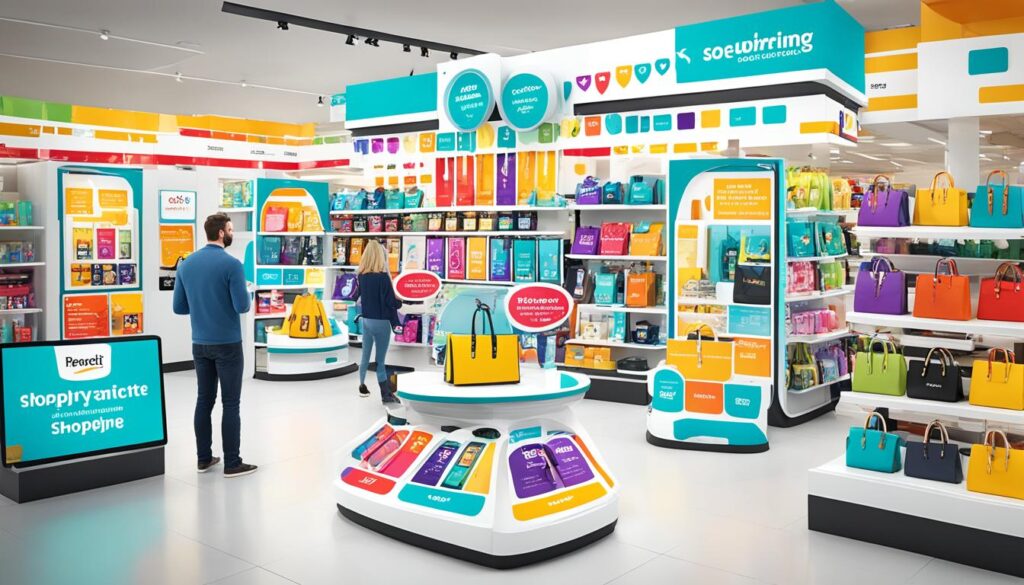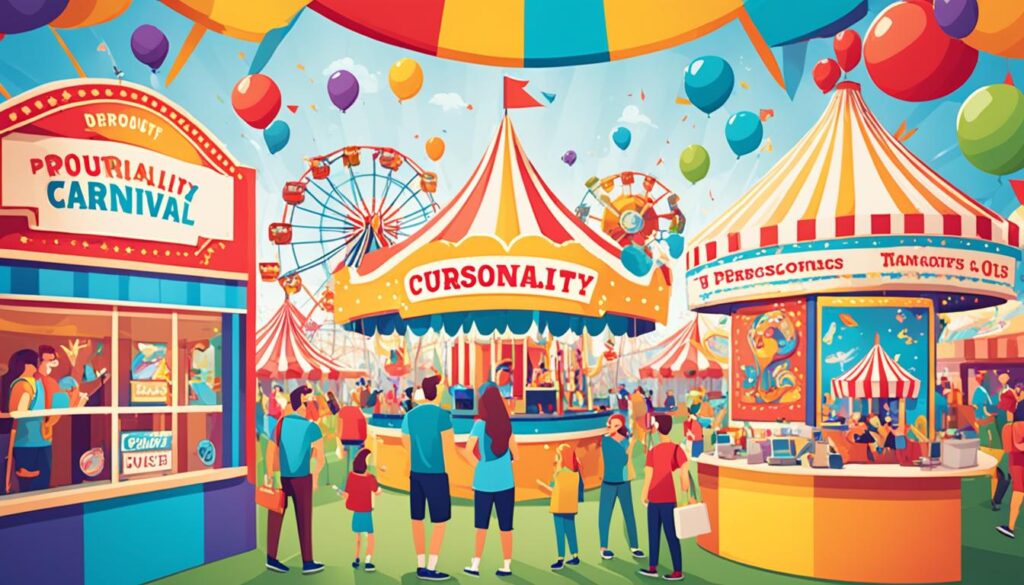In today’s highly competitive retail landscape, capturing and retaining the attention of customers has become more challenging than ever before. With the constant inundation of marketing messages and the increasing use of digital platforms, it’s essential for retailers to find effective strategies to engage their customers and provide a memorable retail experience. This article will explore the concept of retail customer engagement and present proven strategies to foster loyalty and growth.
The Power of Interactive Content in Retail
Interactive content has become a game-changer for retailers aiming to improve customer engagement and enhance the overall retail experience. Research shows that customers are naturally drawn to brands that offer exciting and interactive content. To capture and hold their attention, many retailers are turning to interactive marketing games. These games have proven to be an effective strategy for not only engaging customers but also increasing the time they spend with the brand and generating valuable leads.
One of the primary benefits of using marketing games is the ability to create an immersive and memorable experience for customers. By incorporating elements of fun and interactivity, retailers can establish a deeper connection with their audience, making their brand more memorable and fostering loyalty. Additionally, interactive games provide an opportunity for customers to actively participate and engage, increasing their emotional investment in the brand.
When it comes to retail customer engagement strategies, marketing games have proven to be highly effective. By offering engaging and interactive experiences, retailers can capture the attention of their target audience and encourage active participation. Whether it’s a quiz, a puzzle, or a virtual game, the interactive nature of these experiences encourages customers to spend more time with the brand, increasing the chances of conversion and customer satisfaction.
Examples of Successful Implementations:
-
Example 1: Digital Clothing Retailer X’s Virtual Dress-Up Game
Retailer X implemented a virtual dress-up game on their website, allowing customers to virtually try on clothes and accessories. This interactive experience not only engaged customers but also facilitated informed purchasing decisions. By allowing customers to see how different items would look on them, Retailer X enhanced the retail customer engagement and boosted conversion rates.
-
Example 2: Home Improvement Retailer Y’s DIY Project Builder
Retailer Y created an interactive DIY project builder, which allows customers to select their desired home improvement projects and receive step-by-step guidance along with a list of required materials. This engaging tool not only educates customers but also enhances their retail experience, driving customer engagement and loyalty.
As retailers continue to explore innovative ways to connect with their customers, it’s evident that interactive content, such as marketing games, plays a vital role in improving customer engagement and driving growth. From virtual try-ons to DIY project builders, these interactive experiences create a unique connection that traditional marketing methods cannot replicate. By integrating interactive content into their retail strategies, retailers can enhance the overall customer experience and build stronger, long-lasting relationships.
Instant Win Games for Engaging Customers
Instant win games have become a popular way to drive customer engagement in the retail industry. These games offer participants the chance to instantly win prizes upon submission, creating a sense of excitement and engagement. Unlike traditional sweepstakes, instant win games provide immediate gratification, which is highly appealing to customers.
One of the key advantages of instant win games is their effectiveness in driving brand awareness. By offering the opportunity to win prizes, retailers can capture customers’ attention and encourage them to interact with the brand. This not only increases brand visibility but also creates a positive association between the brand and winning experiences.
In addition to brand awareness, instant win games are a powerful tool for collecting leads. Participants willingly provide their contact information in exchange for a chance to win, allowing retailers to build a valuable database of potential customers. These leads can be further nurtured through targeted marketing efforts, increasing the likelihood of future purchases.
Furthermore, instant win games can also drive sales. By integrating interactive components into the game, such as scratching, spinning, or pulling a lever, retailers can create an engaging and immersive experience for participants. This interaction increases the time customers spend with the brand and creates opportunities for showcasing products or promotions, ultimately leading to higher conversion rates.
“Instant win games provide an exciting and rewarding experience for customers, making them more likely to engage with and remember the brand.”
One of the standout examples of successful instant win games is Evergreens Restaurants’ “12 Days of Giveaways” campaign. By offering daily chances to win various prizes, the campaign generated significant customer engagement and drove foot traffic to their locations. Similarly, Rogue Ales and Spirits’ “Spin to Win Contest” offered participants the opportunity to spin a virtual wheel for a chance to instantly win prizes, resulting in increased brand visibility and customer excitement.
When utilizing instant win games, it is important to optimize the user experience and make the game highly shareable. Incorporating interactive elements, such as visually appealing scratch-off cards or engaging spin wheels, enhances the overall experience and encourages participants to share their excitement with their friends and family, driving additional brand exposure.
Puzzles for Increased Engagement and Brand Exposure
Puzzles have long been known to capture and hold individuals’ attention, providing a sense of accomplishment when completed. In the retail industry, interactive puzzle games can be used to increase customer engagement and promote brand exposure.
By asking customers to solve interactive puzzles like jigsaw puzzles, crosswords, or word scrambles, retailers can increase the amount of time customers spend with their brand and enhance the likelihood of future purchases.
A successful example of an interactive puzzle game is SeaComm Federal Credit Union’s Pic-to-Plunky Giveaway.
The Power of Puzzles in Retail
Interactive puzzles offer a unique way of engaging customers in the retail space. Unlike traditional marketing strategies, puzzles provide an immersive and interactive experience that encourages active participation from customers.
When customers take part in solving puzzles, they are actively engaging with the brand and its messaging, creating a deeper connection and increasing the likelihood of brand recall and loyalty.
“Puzzles offer a fantastic opportunity for retailers to not only capture the attention of their target audience but also create a memorable brand experience. By incorporating puzzles into their marketing efforts, retailers can enhance customer engagement, promote brand exposure, and ultimately drive customer loyalty.” – Sarah Johnson, Marketing Director at Puzzle Retail Solutions
Strategies for Implementing Puzzles
When implementing puzzle games in retail, it’s essential to consider the specific objectives and target audience. Here are some strategies to effectively use puzzles for customer engagement:
- Create puzzles that align with your brand: Develop puzzles that reflect the values and messaging of your brand. This alignment will not only engage customers but also reinforce your brand identity.
- Offer incentives and rewards: Provide incentives, such as discounts or exclusive offers, for customers who successfully complete the puzzles. This encourages participation and boosts customer loyalty.
- Make it shareable: Incorporate social sharing buttons or encourage customers to share their puzzle achievements on social media. This increases brand exposure and attracts new customers.
By implementing these strategies, retailers can leverage the power of puzzles to increase customer engagement, promote brand exposure, and ultimately drive customer loyalty.

Whether it’s a digital or physical puzzle, the key to success lies in creating a fun and interactive experience that captivates and challenges customers. By integrating puzzles into your retail strategy, you can create a memorable brand experience, foster customer loyalty, and drive business growth.
Knowledge Games for Interactive Learning and Engagement
Knowledge games, such as quizzes and trivia, are a powerful way to drive customer engagement in the retail industry. By presenting customers with questions related to the brand, product, or industry, retailers can create an interactive learning experience that not only increases customer engagement but also promotes brand awareness. Quiz games allow customers to test their knowledge while having fun, making them an effective tool for both education and entertainment.
One successful example of utilizing knowledge quizzes to drive engagement is the popular streaming platform, Netflix. Netflix has captivated fans by creating knowledge quizzes, such as the “You” Trivia quiz, to engage their audience and promote new seasons of their hit shows. These quizzes not only challenge fans’ knowledge but also spark conversations and deepen the connection between the viewers and the brand.
In the healthcare industry, Stemcell Technologies implemented a knowledge game called “Which Immune Cell Are You?” quiz. This interactive quiz aimed to educate customers about their products and generate leads. By asking customers questions about their immune cell preferences, Stemcell Technologies captured valuable data and provided an engaging experience that increased customer engagement.

Knowledge games offer retailers the opportunity to capture customers’ attention, encourage learning, and enhance brand interaction. By incorporating quiz games into their customer engagement strategies, retailers can create memorable experiences that not only educate their customers but also promote brand loyalty and advocacy.
Personality Quizzes for Customer Engagement and Sharing
Personality quizzes have gained popularity for their fun and shareable nature. Buzzfeed-style personality quizzes provide an opportunity for customers to showcase their knowledge or personality traits and share their results with friends. These quizzes not only engage customers but also promote brand awareness and can lead to higher conversion rates.

For example, Timbuktu Labs, Inc. created a personality quiz to promote their digital magazine and drive lead generation and engagement. By identifying the type of “Rebel Girl” the participant is, the quiz created a sense of personal connection with the brand.
The Benefits of Gamification in Retail
Gamification in retail offers a multitude of advantages for both retailers and customers. By incorporating game mechanics and elements into the shopping experience, retailers can enhance customer engagement, foster personalization, encourage social interaction, boost brand loyalty, and gain valuable data-driven insights.
Enhanced Retail Customer Engagement
One of the primary benefits of gamification in retail is the ability to engage customers on a deeper level. By implementing interactive and immersive game elements, retailers can create a more enjoyable and memorable shopping experience. This heightened engagement increases the likelihood of customers returning to the store and making repeat purchases.
Personalized Shopping Journeys
Gamification allows retailers to tailor the shopping experience to each individual customer. Through personalized game mechanics, such as targeted offers, custom recommendations, and exclusive rewards, retailers can make customers feel valued and create a sense of exclusivity. This personalized approach not only enhances customer satisfaction but also increases the likelihood of customers becoming loyal advocates for the brand.
Encourages Social Engagement
Gamification in retail often includes social features that encourage customers to interact with the brand and share their experiences with others. Whether it’s through leaderboards, challenges, or social media integration, gamification creates opportunities for customers to engage with the brand and connect with like-minded individuals. This social engagement not only increases brand visibility but also fosters a sense of community and belonging among customers.
Data-Driven Insights for Continuous Improvement
The use of gamification in retail provides valuable data that can be analyzed to gain insights into customer behavior, preferences, and trends. By tracking customer interactions, game outcomes, and participation rates, retailers can refine their marketing strategies, improve personalized offerings, and identify areas for growth. These data-driven insights empower retailers to make informed decisions and continuously optimize the customer experience for maximum engagement.

Gamified rewards, personalization, social engagement, and data-driven insights are all powerful tools that retailers can leverage to create memorable shopping journeys and foster long-term customer loyalty.
Conclusion
In today’s competitive retail industry, driving customer engagement is crucial for success. By implementing interactive content such as marketing games, puzzles, knowledge games, and personality quizzes, retailers can effectively capture and maintain the attention of their customers. These gamified experiences create a sense of excitement and personalization, fostering a strong connection between customers and brands.
The power of gamification in retail lies in its ability to encourage social engagement and enhance customer loyalty. Through interactive content, retailers can not only increase brand advocacy but also gather valuable data-driven insights. By leveraging these insights and analyzing customer behavior, retailers can identify growth opportunities and provide exceptional retail experiences that keep customers coming back.
By prioritizing retail customer engagement, retailers can cultivate long-lasting relationships with their customers. The key is to constantly adapt and innovate, staying ahead of the competition. With the help of interactive content and gamification strategies, retailers can create a memorable and personalized shopping journey that resonates with customers and keeps them loyal to the brand.
FAQ
What is the importance of retail customer engagement?
Retail customer engagement is crucial in today’s competitive landscape as it helps capture and retain customers’ attention, leading to increased brand loyalty and growth.
How can interactive content enhance customer engagement in retail?
Interactive content, such as marketing games, puzzles, knowledge games, and personality quizzes, can provide exciting experiences that engage customers and increase their interaction with the brand.
What are instant win games and how do they improve customer engagement in retail?
Instant win games offer participants the chance to win prizes immediately upon submission, creating excitement and increasing brand engagement. These games are highly shareable and can drive brand awareness, collect leads, and boost sales.
How can puzzles be used to increase customer engagement and brand exposure in retail?
Interactive puzzle games, such as jigsaw puzzles, crosswords, or word scrambles, can captivate customers’ attention, prolong their time with the brand, and enhance the likelihood of future purchases.
What role do knowledge games play in driving customer engagement in retail?
Knowledge games, like quizzes and trivia, engage customers by offering interactive learning experiences. By asking questions related to the brand, product, or industry, retailers can collect valuable leads, promote brand awareness, and increase customer engagement.
How can personality quizzes foster customer engagement and sharing in retail?
Personality quizzes provide an opportunity for customers to showcase their knowledge or personality traits and share their results with friends. These quizzes engage customers, promote brand awareness, and can lead to higher conversion rates.
What are the benefits of gamification in retail?
Gamification in retail offers numerous benefits, including enhanced customer engagement, personalized experiences, increased social engagement, boosted brand loyalty, and valuable data-driven insights.
How does retail customer engagement drive loyalty?
By using strategies like interactive content and gamification, retailers can create memorable shopping experiences that foster long-term customer loyalty, leading to repeat purchases and advocacy.
